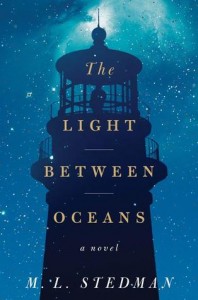 Thanks to everyone who joined us for this month’s virtual book club. Today we’re discussing The Light between Oceans by M. L. Stedman.
Thanks to everyone who joined us for this month’s virtual book club. Today we’re discussing The Light between Oceans by M. L. Stedman.
Here’s how it works: I’ll throw out a few topics for discussion, and you can write your responses about these topics (or others you’d like to discuss) in the comment section.
Discussion #1: Moral Dilemmas
My favorite aspect of this book was the way it posed moral dilemmas and forced me to ponder what I’d do in that situation. I like to think I’m not the kind of person who would keep someone else’s baby, but when I put myself in Isabel’s shoes, I understand why she did what she did. I also appreciated that the book explored what happens when you make one bad choice and everything unravels to the point that it seems like there’s no longer a right choice to make.
Which family did you want Lucy-Grace to end up in? Why? Have you ever found yourself in a spot where it seems like the right thing is no longer possible?
Discussion #2: Justice vs. Mercy
When the baby washes up on Janus Island, Isabel says: “Love’s bigger than rule books. . . . Our prayers have been answered. The baby’s prayers have been answered. Who’d be ungrateful enough to send her away?” (p. 103). She sees the world—and this baby—through the eyes of mercy. Tom, on the other hand, is plagued by his conscience and his desire to do the right thing: “You could kill a bloke with rules, Tom knew that. And yet sometimes they were what stood between man and savagery, between man and monsters” (p. 104).
Did you resonate more with Tom or Isabel in this tension between justice and mercy? Did your perspective change as the book went on? In your own life, do you tend to lean more toward mercy or justice?
Discussion #3: The Book’s Setting
The lighthouse seems to serve as something of a metaphor in the book—a symbol of hope and safety for Isabel and Tom. When they left the lighthouse behind, it was almost as if their family’s light was extinguished. As they left Janus Rock, Tom wished Isabel would “give him one of the old smiles that used to remind him of Janus Light—a fixed, reliable point in the world, which meant he was never lost. But the flame has gone out—her face seems uninhabited now” (p. 214).
Do you think this story would have worked in another setting? Would you be able to live on an isolated place like Janus Island?
Discussion #4: Tense Shifts
Okay, this is a nerdy English major observation. Did you notice that the tense changed between past and present? It bothered me a lot at first, but as the story progressed, I realized the author was doing it for effect to make certain scenes more intense. By the end, I was grudgingly willing to go along with it.
What did you think about the tense changes? Was it distracting, or did you think it worked?
Discussion #5: The Ending
When I got to a certain point in the book, I had this horrifying realization: It’s impossible for this book to have a happy ending. I was right. It was sad for Isabel and Tom, who lost the little girl they loved and the chance to be parents. It was sad for Hannah, who would never truly get back the child she lost. And most of all, it was sad for Lucy-Grace, whose life was irreparably splintered through no fault of her own. I also felt a little emotionally manipulated at the end. Of course, Isabel is dead when Lucy-Grace returns. And of course she died just a week ago. And of course I cried buckets of tears onto my pillow against my will.
What did you think of the ending? Did it seem realistic? Is there an ending you would have liked to see instead?
Rating:
Although the plot was a bit melodramatic at times, I appreciated the evocative themes and the rich writing. The characters felt real, and their internal struggles were palpable. This one is going to stay with me for a while. I would give it three stars (out of five).
How many stars would you give this book?
{Remember: I’ll give away a free book to one lucky commenter! Respond by Friday to be eligible to win.}
